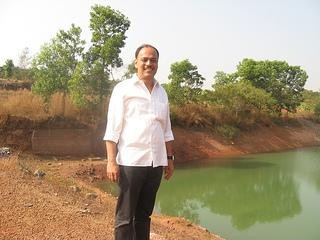Climate and Weather
A source today, scarce tomorrow: Educational videos on global freshwater problems
Posted on 09 Mar, 2013 09:10 AMWhat are the water sources and where is the water utilized ? The short videos below aim to educate us on simple facts of freshwater sources and scarcity....
#SparkTheRise Twitter conference on ‘Water sustainability - A key to our future’, by Mahindra and Ashoka India
Posted on 07 Mar, 2013 11:03 AM

Lets paint our cities green ! - Issues of collective effort come to the fore at the organic urban gardening conference in Chennai
Posted on 06 Mar, 2013 10:25 AMThe maddening pace of cities have the potential to drive one up the wall. But, there are options - to unwind and to mend the disconnect. Tending to plants is a popular hobby and it is a fact that a sizeable number of city dwellers have taken to gardening in the past, finding solace in twines and tendrils.
Reviving a lake transforms 120 acres of barren land into a self-sufficient organic farm: The story of Rajesh Naik and Oddoor farms, Mangalore, Karnataka
Posted on 05 Mar, 2013 03:39 PMA visit to Oddoor farms near Mangalore, Karnataka, provides an inspiring example of the efforts made by Rajesh Naik ji to transform 120 acres of barren land into a lush green farm through his persistent efforts of creating a two acre and fifty feet deep lake, which has not only transformed the surrounding area, but has also helped in improving the water table in the surrounding village, besides helping in the development of a self sufficient organic farm and a dairy.
Oddoor farms, around 25 kilometres away from Mangalore city is a great example of a very successful effort made by Rajesh Naik ji who has transformed 120 acres of barren land into a self sufficient organic farm by developing a 50 feet lake on two acres of land. The journey has been a long one and not without its share of challenges, but persistence and constant optimism and hard work to overcome challenges has reaped results in the last twenty years, informs Rajesh Naik ji.

Rajesh Naik ji near the lake he has developed at the Oddoor farms near Mangalore
Centre for Science and Environment invites applications from journalists for its media fellowships to focus on off-grid renewable energy - Apply by March 15, 2013
Posted on 26 Feb, 2013 06:25 PMDuration
2 Months - April 1, 2013 to May 31, 2013
Background
According to the Intergovernmental Panel on Climate Change’s (IPCC) 2011 report on renewable energy sources and climate change mitigation, 85 per cent of current primary energy driving global economies comes from the combustion of fossil fuels. These fuels account for 56.6 per cent of all anthropogenic GHG emissions in the world.
About 75 million of India's 226 million households (400 million people) have no access to power, says the Union ministry of new and renewable energy (MNRE). In rural areas, the electrification rate hovers at 47.5 per cent -- either the grid does not reach these places, or even if it reaches, it fails to provide end-point connectivity. In such a scenario, decentralised off-the-grid renewable power projects could be a way out.
Centre for Science and Environment’s (CSE) Media Fellowship Programme invites journalists from India writing/reporting in any language to apply for its 16th Media Fellowships to address, analyse and report on the issue of off-grid renewable energy.
Strategies for achieving environmental sustainability in rural development - A report by United Nations Development Programme
Posted on 23 Feb, 2013 10:22 AMThis report by the United Nations Development Programme (UNDP) presents strategies for inclusive rural development embodying the principles of environmental sustainability. It recommends measures needed to achieve green, including measuring and tracking, the use incentives and the building of capacities. It also contains a number of case studies showing how green results can be achieved.
Living on water: An architect constructs homes, offices and even a golf course as floating buildings, using water as a workable layer
Posted on 22 Feb, 2013 03:06 PMImagine looking out of your window onto the blue sea, living in a building in the midst of water! Koen Olthius, a Dutch architect’s passion for water has transformed this magical image into reality.
Anthropogenic activities leads to deterioration of groundwater quality: A study of Mayyanad and Edamulakkal panchayats of Kollam district in Kerala
Posted on 22 Feb, 2013 10:07 AMKerala is a rain blessed state in the country. It has highest number of wells, when compared with other states. However due to its slanting topography there is significant decline in the ground water levels leading to severe water scarcity during summer months in most districts of the state. Further over extraction and dependence of groundwater for domestic use from the dug wells especially in rural pockets has resulted in several groundwater problems. In this backdrop the paper in The Ecosan- An International Quarterly Journal of Environmental Science, sheds light on groundwater quality issues in two panchayats of Kerala.
Some strategies for managing groundwater by Aditi Mukherji, IWMI
Posted on 22 Feb, 2013 09:53 AMGroundwater is essential for India's agricutural economy. However, there is a large variation in the groundwater resources of each region. Some regions are already over-exploited, while others can still tolerate more withdrawal. In her blog 'Waterscapes', Aditi Mukherji discusses the need for regional strategies to manage groundwater economy.






